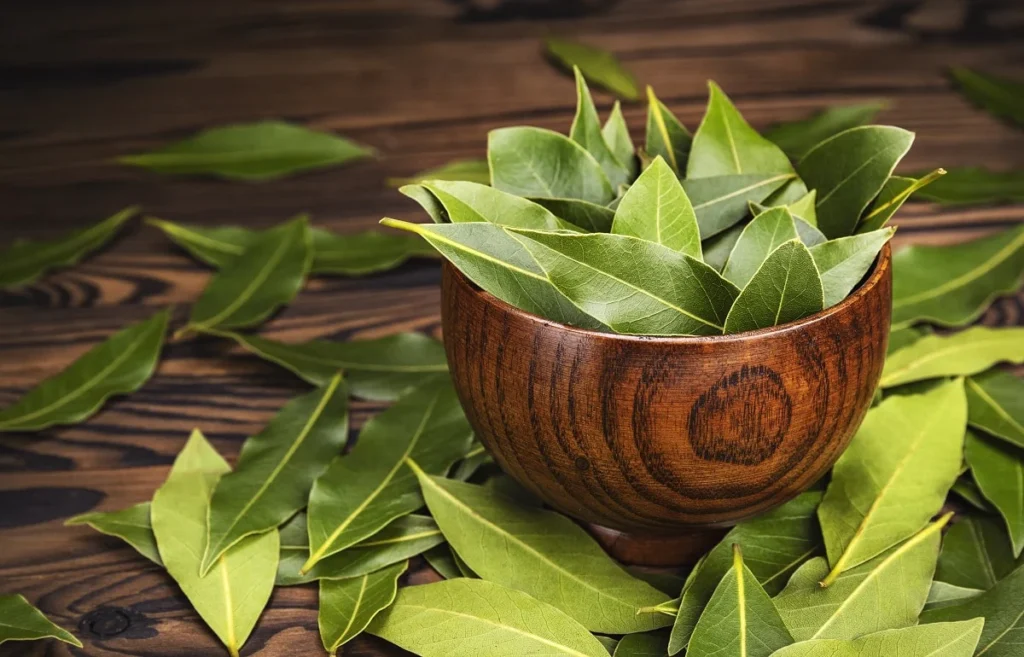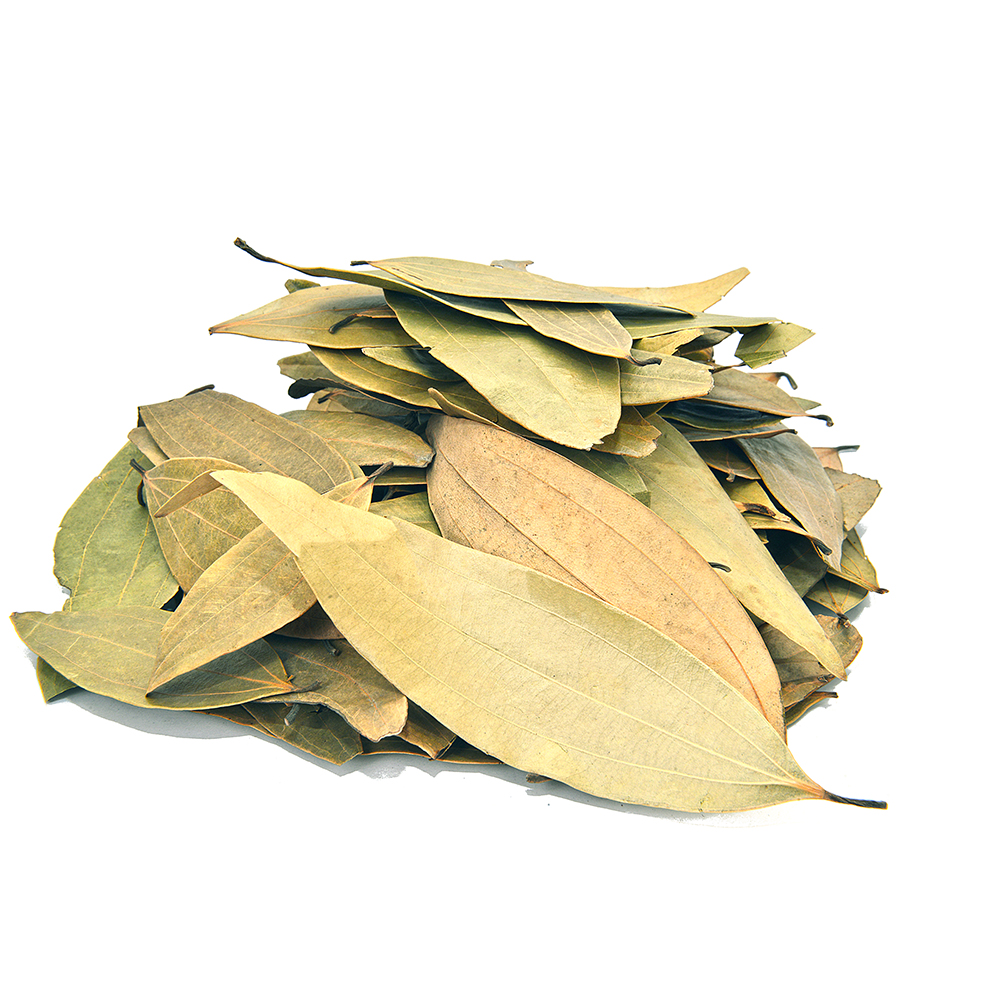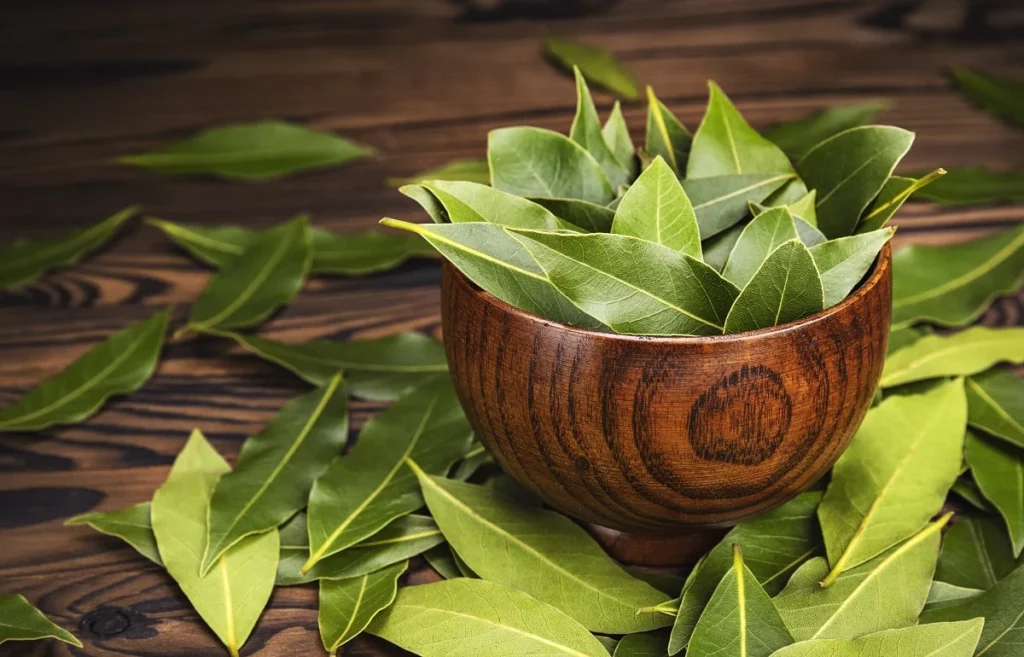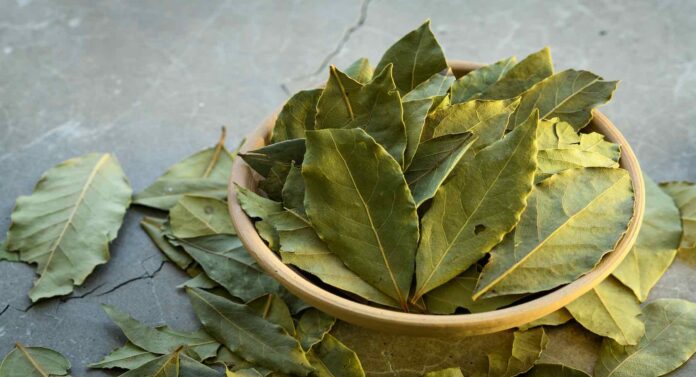INTRODUCTION

Urdu name: Tez Patta (تیز پتہ)
Bay leaf, derived from the Laurus nobilis plant, is an aromatic leaf commonly used in cooking for its distinctive flavor. The leaves are typically used whole and are added to dishes like soups, stews, sauces, and marinades to enhance taste. They are known for their slightly floral and herbal notes. Once cooked, bay leaves are usually removed before serving, as they are tough and not meant to be eaten. In addition to culinary uses, bay leaves have been used in traditional medicine for their potential health benefits, including anti-inflammatory and antioxidant properties.
Medicinal Properties
Bay leaves have several medicinal properties that provide health benefits. They contain eugenol and essential oils that reduce inflammation, helping with conditions like arthritis and muscle pain. Rich in antioxidants, bay leaves protect cells from damage and lower the risk of chronic diseases. They also help improve digestion by stimulating digestive enzymes, relieving issues like bloating and gas. Additionally, bay leaves have antimicrobial properties that can fight bacteria and fungi, preventing infections. Some studies suggest they may help regulate blood sugar levels, which is beneficial for people with diabetes. Finally, bay leaves can soothe respiratory problems, making them useful for coughs and colds. Overall, bay leaves are beneficial for both cooking and health.
Forms
Bay leaves are available in several forms for culinary and medicinal uses, including:

- Whole Dried Leaves: The most common form used in cooking, typically added to soups, stews, and sauces. They are removed before serving.
- Crushed or Ground Bay Leaves: These are finely ground bay leaves used as a spice, providing a more intense flavor in recipes.
- Fresh Bay Leaves: Fresh leaves can be used in cooking, offering a more vibrant flavor than dried ones, but they may be less available.
- Bay Leaf Powder: Made from ground dried bay leaves, this powder can be used in spice blends or sprinkled directly into dishes.
- Bay Leaf Oil: An essential oil extracted from bay leaves, used for aromatherapy, massage, or as a flavoring agent in food products.
- Bay Leaf Tea: Steeping dried or fresh bay leaves in hot water creates a herbal tea known for its potential health benefits.
Health Benefits
Bay leaves offer several health benefits due to their rich nutrient profile and medicinal properties. Here are some key health benefits:
Immune System Health.
Bay leaf is a good source of vitamin A, vitamin B6, and vitamin C. These vitamins are all known to support a healthy immune system.
Digestive Aid
Bay leaves may have an impact on the gastrointestinal system by preventing gastric damage and promoting urination. This helps release toxins in the body and aids in the health of the kidneys. Furthermore, the organic compounds found in bay leaves are very effective in helping with an upset stomach, soothing irritable bowel syndrome or even making it easy to digest food.
Reduces Type 2 Diabetes Risk Factors.

A pair of small studies suggested that taking ground bay leaf capsules or drinking tea brewed from Turkish bay leaf may lower your blood sugar levels. However, one of the studies was small and the other tested bay leaves on healthy volunteers, not people with diabetes.
Blood Sugar Control
Some studies suggest that bay leaves may improve insulin sensitivity and help regulate blood sugar levels. This can be especially beneficial for individuals with type 2 diabetes, as incorporating bay leaves into the diet may assist in managing blood glucose levels.
Heart Health
The anti-inflammatory and antioxidant properties of bay leaves contribute to heart health by reducing cholesterol levels and promoting healthy blood circulation. By lowering inflammation, bay leaves may help decrease the risk of heart disease.
Respiratory Health
Bay leaves possess soothing and expectorant properties, which can be helpful for relieving respiratory issues such as coughs, colds, and congestion. Inhalation of bay leaf steam may also alleviate sinus pressure and improve overall respiratory function.
Antimicrobial Effects
The essential oils extracted from bay leaves have demonstrated antimicrobial properties against various bacteria and fungi. This means they may help fight infections and support overall immune health.
Stress Relief
Bay leaves are often used in aromatherapy for their calming effects. Their pleasant aroma can help reduce stress and anxiety levels, promoting a sense of relaxation and well-being.
Fights Against Fungal Infections
Bay leaf has been shown to provide antifungal properties, which can combat fungal conditions. These properties along with its vitamin C content can protect the skin from any kind of infection and irritation.
Resolves Hair Issues
Bay leaves are loaded with properties that can work wonders for your hair and lead to hair growth. All you need to do is to steep bay leaves in water and then rub them on your scalp after shampoo to get rid of dandruff.

Side Effects
Bay leaf is commonly consumed in foods. Bay leaf that has been ground into powder is possibly safe when used as medicine, short-term. But if you cook with whole bay leaf, remove it before eating. Eating the whole, intact leaf is likely unsafe. The leaf can’t be digested, so it remains whole while passing through the digestive system. This means it can become lodged in the throat or pierce the lining of the intestines.




